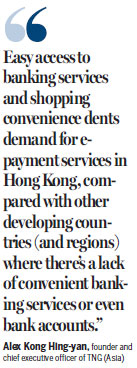Grabbing the lucrative e-payment market
Updated: 2016-07-15 08:26
By Oswald Chan in Hong Kong(HK Edition)
|
|||||||||
Hong Kong-domiciled digital payment service providers are bracing themselves for intense market competition from overseas players, as a bigger pie of digital payment industry can help all parties thrive.
Apple Pay - the mobile payment and digital wallet service unveiled by US technology guru Apple in October 2014 - will soon land in Hong Kong, allowing users access to mobile payment services by using various models of iPhone and iPad as well as Apple Watch.
Apple Pay will also be accepted at various merchandise stores, including food and beverage, fast fashion and convenience stores, in the city.
Meanwhile, mainland e-commerce giant Alibaba Group's third-party online payment platform Alipay had debuted in Hong Kong in January last year. So far, nearly 30 retailers - from the jewelry, apparel, cosmetics and electronics sectors to convenience stores - have teamed up with Alipay.
While overseas players are venturing into Hong Kong's digital payment market, local companies are also gearing up to grab a slice of the high-growth potential market.

SAR-domiciled e-payment service provider TNG (Asia) launched its TNG Wallet 2.0 service last month, by which it wraps up year-round cash withdrawal hotspots, bank transfer and instant credit card top-up service, as well as TNG membership.
Founded by six partners from the information technology, legal and corporate finance fields, TNG (Asia) was set up in 2013 with an initial investment of HK$100 million. The company may undertake another round of financing as it plans to venture into at least one Southeast Asian market by year-end.
However, its foray into the Hong Kong has not been smooth going.
"Easy access to banking services and shopping convenience dents demand for e-payment services in Hong Kong, compared with other developing countries (and regions) where there's a lack of convenient banking services or even bank accounts," Alex Kong Hing-yan, founder and chief executive officer of TNG (Asia), tells China Daily.
Since launching e-payment services in Hong Kong in late 2014, the e-wallet service provider has secured 300,000 customers. At present, it facilitates 28,000 digital business transactions daily with an average spending of HK$68 per transaction.
The company expects to solicit 1 million customers by the end of this year and become profitable by the end of 2017. At this stage, the enterprise makes its revenue mainly from the 1 to 1.5-percent commission charged to merchants.
Customers can enjoy TNG (Asia)'s digital payment options in 500 local retail merchant outlets. The solutions provider had started digital payment services for taxi fares in April, and plans to launch similar payment services for bus fares within this year.
"We're targeting the 80 percent local merchants who do not have Octopus or credit-card payment (Visa and MasterCard) facilities at present, indicating how lucrative this market segment is," Kong adds. "Using traditional credit card terminal facilities is costly for most of the merchants, and TNG e-wallet allows enterprises to minimize their operating costs, and leverage the convenience of e-payment to attract customers."
The company is not afraid of fierce competition as it's confident that its value-added services can win over more customers. Users will benefit from an array of basic services like person-to-person (P2P) money transfer to friends, real-time bill payment, person-to-merchant (P2M) payment, receiving payment, e-coupons and e-tickets, to upgraded services like bank transfer and credit-card top-up.
"Apple Pay offers no value-added services at all. However, we welcome Apple Pay and Alipay to make their market presence here because it can help educate more local residents to be more familiar with various e-payment options," says Kong.
Expressing optimism over the industry's future development, he adds: "In the long run, we envisage bank transactions and payment services will be completely substituted by various e-payment options."
TNG (Asia) will launch a cross-border P2P fund transfer service this year, enabling thousands of foreign domestic helpers in Hong Kong to remit funds to their home countries.
A financial technology (FinTech) report conducted by auditing advisory firm PricewaterhouseCoopers (PwC) in March said FinTech enterprises are confident of grabbing one-third of the business from traditional financial institutions.
"FinTech has the potential to deliver a unique customer experience and that is one of the main reasons why financial institutions see it as a game changer," says Matthew Phillips, financial services leader for PwC China and Hong Kong.
Another positive factor is that Hong Kong's financial regulatory bodies have taken a proactive approach in fostering market development.
The Payment Systems and Stored-Valued Facilities (SVF) Ordinance, which took effect in November last year, aims to launch a new regulatory regime for SVF service providers. The Hong Kong Monetary Authority (HKMA) will start granting SVF service provider licenses in November this year.
The ordinance requires all SVF service providers to segregate clients' float money from their own funds, and all SVF providers have to arrange a third-party trust to ensure clients' funds are adequately protected.
"Hong Kong is one of the few places in the world where the government has drafted regulations to monitor the digital payment industry. The regulations clearly define the scope of business activities that an e-payment service provider can undertake. This is good for the industry's development as industry players know the boundaries of their business activities," says Phillips.
TNG (Asia) is one of the 10 Hong Kong-domiciled companies that have applied to the HKMA for a SVF service provider license. More than 20 companies have applied to the HKMA for SVF licenses.
Despite recent market endeavors, Hong Kong still lags behind in FinTech innovation compared to London and New York, according to an Ernst and Young's FinTech report in February.
Hong Kong saw only $66 million FinTech investment last year compared to $755 million and $2.02 billion in London and New York, respectively, the report said.
According to government investment promotion agency InvestHK, there were 86 FinTech startups in the SAR in 2015 - up 16 percent from the previous year.
oswald@chinadailyhk.com
|
A man checks a mobile payment service app on a smartphone in Hong Kong. Easy access to banking services and shopping convenience may have dented demand for e-payment services in Hong Kong, experts say. Billy H.C. Kwok / Bloomberg |
(HK Edition 07/15/2016 page9)
